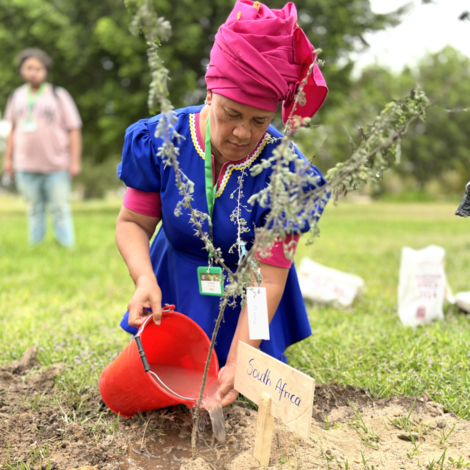How can indigenous knowledge and biodynamics come together? What is the "African way" of biodynamic farming? Feya Marince shares her insights in an interview with Kalle Hübner. The two met at the first African Biodynamic Conference in Egypt.
Kalle Hübner: In your speech at the Cairo conference, you mentioned that people are awakening to the old wounds of colonialism. What do you mean by that?
Feya Marince: Change is inevitable for us as human beings. We’ve come to realise that we cannot continue with the industrial, conventional agriculture imposed on us by colonialism. It’s a type of agriculture that simply doesn’t work. We take more from the Earth than we need, which is disrespectful. It almost feels like the Earth is responding and saying, “Enough is enough!” The Earth is a living being. This is about healing the connection between us and Mother Earth. For too long, we’ve seen ourselves as separate from Earth’s forces. Now we are being offered a new opportunity – perhaps our last – to heal the Earth and, in doing so, heal ourselves.
Many people in Cairo spoke of an "African way" of biodynamic agriculture. What does that mean?
That is what we need to discover. Here in Africa, we’re on a journey of identity. We are all at different stages of development. Some have received biodynamic training, are deeply connected to the spiritual aspects, and use biodynamic methods to heal the soil and build local communities on these principles. Others are using the preparations mainly to meet certification standards and export to Europe. Premium organic products are in high demand in the European market, which is good! But as we engage with these standards and certifications, we must also carry forward the spiritual aspects.
Some biodynamic preparation plants, like valerian, are not native to Africa. Components like oak bark and stag bladders need to be imported. This issue was raised during the conference. Do you see a solution?
The preparations are key when it comes to developing an "African way" of biodynamic agriculture and protecting plants in Africa. We must discover alternative preparations that are native to Africa. There are plants here with similar properties. We need to research these plants deeply, using intimate observation of the nature of plants and animals, and develop a profound understanding of their life forces. I believe this is the biggest challenge for biodynamics in Africa right now.
In 2022, you co-founded the Indigenous Biodynamic Association of Africa (IBAA). What are its goals?
Through this association, we have the opportunity to make biodynamics more widely known. We aim to give farmers the tools to reconnect with our original, indigenous ways of farming and to develop their own identity. Additionally, the association allows us to work across borders, helping Africa find its voice and be heard on the global stage.
How do you introduce biodynamic methods to indigenous communities?
We start with compost-making. We encourage close observation and comparisons. When you spark curiosity in people, they open up to this new way of farming, and they often connect it to the stories told by their grandparents. That’s when the conversation begins. I then tell them that biodynamics is already 100 years old, which surprises many, as they wonder why it hasn’t been introduced in Africa sooner. The wisdom of indigenous people is the key that opens the door. We build on that wisdom and go further by introducing the fundamentals of anthroposophy. Everything starts with conversations about our ancestors and how they farmed in harmony with nature.
You mentioned earlier that the Earth is a living being. "The Earth as a living being" is also the theme of the upcoming Agriculture Conference 2025 at the Goetheanum. What can we learn from the African perspective?
Let me give you an example. As a child, I couldn’t understand why farmers used to take off their shoes during planting. Recently, I visited a local community and spoke with a 96-year-old farmer. She described how, during planting, she connected with the seeds in her hand, and how this connection flowed through her feet into the fertile soil. At the same time, she set an intention for a good harvest in her mind. Here, we have a completely intuitive understanding of the Earth as a living being. The farmers knew how the living Earth, humans, and the cosmos are connected in farming.
What does "the Earth as a living being" mean today?
To me, it means researching and applying preparations to bring the soil to life. Living soil produces living plants, which feed living animals and people, who in turn enliven the soil through good farming practices. This creates a balanced ecosystem of giving and receiving vitality. Indigenous cultures help us rediscover what life truly is. Farmers, as caretakers of the Earth, maintain this connection with the Earth on a soul level. Now is the time to restore wholeness. Farmers are called to this – it’s deep within them. It’s the soul's longing to contribute to the healing of Mother Earth, for the benefit of all.
The interview is published in the new issue of the magazine "Living Farms".
